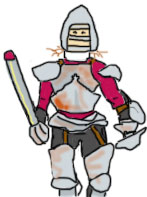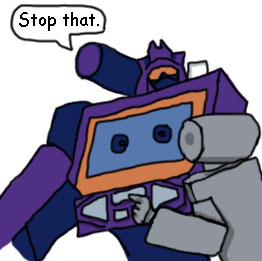I wrote a personal essay on how it felt to be a woman warrior in medieval reenactment combat (SCA). It started as something I just wrote for myself, as I was working on my memoir about playing football. Then I saw an open call for short nonfiction on the subject of women and unusual hobbies. I quickly cleaned the essay up, added what I thought was a hopeful and encouraging ending, and submitted it. The piece was published (read it here) and I got my token payment and felt like, “yay, I did a nonfiction!” I figured maybe ten people would read it, despite sharing the link on all my socials. And that was it.
For about two years. Then, suddenly, it went viral, just in SCA circles. I got … a lot of responses. An interrupt-normal-life-and-ability-to-think-about-anything-else level of responses.
The Three Types of Responses
1. The “You see me.”
The smallest group was the nicest, the heartfelt notes from fellow female-identifying fighters, as well as other marginalized fighters, saying, “I felt validated because of what you wrote, thank you.”
This blog post isn’t for them, they get it. We should get coffee sometime.
2. The “You are a terrible person for writing this.”
The second, and most numerous group of messages were, “How dare you say the SCA is sexist! My female friend NEVER had trouble!” with a small subset of, “I’m a woman and I NEVER had trouble!” I was also accused of having made the whole thing up, since it was a paid publication.
The gist of these messages (some where pages long) was “You are wrong and you are mean and you are attacking us.”
Let me start by saying I tried my best to be as honest and personally vulnerable as I could in writing the essay. Yes, these were all real things that happened to me, and that I thought and did. They don’t represent the totality of my experience with SCA combat, but I worked hard to make it an even representation, a mix of the good and the bad in proportion.
Far from being “down on the SCA”, I meant the essay to show how ultimately, as frustrating as it was, the journey was meaningful and therefore worth it, and more women should give it a try.
Clearly, I didn’t succeed in my goal. I deliberately chose to present everything as plainly as possible, sticking to the facts of what happened to leave the reader room to make their own judgements. For example, right after a man tells me I can’t hit him hard enough, I show my friend Steve helping me discover I was not, in fact, hitting hard enough.
I should have pointed out the nuance and contradiction rather than leaving it to the audience. This is a lesson learned, and I thank you for it.
Later in this blog post, I am going to talk about how “I meant well” or “That isn’t what I meant” don’t work as excuses, but I thought I’d throw that out there anyway, so if you are one of the people hurt by my article and you happen to read this, at least you know where I was coming from, and why it was so hard to start this post without refuting specific accusations. (“You say no one ever helped you!” “Uh… other than Alda, Lothar, Ephraim, Steve, and Alaric, who are all specifically mentioned as helping me?” Oop, okay, I almost made it without going there.)
It’s hard not to wonder how many didn’t read the article at all. I suspect many saw the title,”Benevolent Sexism and Modern Chivalry,” read that as an accusation, and went straight into combat mode. “Sexism” is a charged word, people automatically have feelings about it. “Chivalry” is also a charged word, in SCA contexts, where it represents one of the highest status achievements available.
I can say I didn’t choose the title, but I did approve it when the editor suggested it.
I suspect a lot of the more vitriolic responses were that way because of a feeling of betrayal. Though the SCA is a huge, international organization with tens of thousands of paying members, they might feel marginalized as a special interest group, as “those weirdos” their neighbors don’t get, and any form of criticism may be seen as an attack, as “punching down.” How much worse to be criticized by your own!
In answer to that, I apologize. It was never my intention to paint the SCA as being in any way less than a valid and fun hobby that millions have enjoyed.
I wanted to explore the weird interplay of the sexism in modern society with the SCA’s unique co-ed sport. Because it is egalitarian in its hopes and it tries to be equal in execution. I love that there is a sport where I can compete against men on equal footing! But I wanted to share the unique horror of being held up to be someone’s ideal of Eowyn or Valkyrie, a pedestal one can’t help but be knocked off of, again and again, twenty times a practice, because there is no room in fantasy for the merely competent female warrior.
Despite the best intentions, biases and socialized behaviors hold a person back. Half the sexism was coming from inside my own helmet, and it could feel like fighting a battle before every battle. But it was not a battle against the SCA. It was a battle without an opponent. There was no “bad man.” (More on that later.)
Bias and emotional baggage aren’t unique to the SCA, or sports, or any human endeavor. If I ever write a piece about this again, I’ll make sure this is stated clearly.
I digress. This group of respondents are unlikely to read this blog post.
3. The “Was I one of the bad ones?”
I am writing this whole blog post to address the third group of responses, the ones who do have something to gain from reading this. (Ha ha yes that was a lot of preamble, wasn’t it?)
This group contains the dozens of men who contacted me asking if they had treated me okay as a fighter, if they were “one of the bad ones.”
I laughed at first, because it seemed this sort of message came only from all the nicest dudes. I never got contacted by the (carefully anonymized) fighters I had actually reported hurtful experiences with. (With one exception, where there was an in-person apology, and I apologized as well for not anonymizing him enough that he didn’t recognize himself.) Most of these people were dear friends, guys I’d hung with, who had been there to repair a strap or share a beer.
I assured them no, they were lovely, but now I feel I did a disservice to them with that quick answer. Because … there are no “good ones” or “bad ones.”
So … finally, the point of this entire blog post:
It Was Never About Bad Actors
Hurt and frustration can come from unconscious actions that aren’t meant to be hurtful. In fact, that’s where they usually come from. The world is thankfully rather short on true villains.
You can’t know the times you neglected to extend an invitation, the compliments you gave that were really burdens.
Unconscious bias is unconscious. That’s part of what makes it so hard to deal with. Cultural norms and politeness can be systems of oppression.
Things you DON’T do can be the problem. It’s not enough to not be an active bully. That’s still passively letting the status quo be. And that passivity supports oppression, which is rough, because it is uncomfortable and grueling to be actively anti-status-quo, and you already have a day-job, a family, and a very involved hobby!
One specific complaint in my essay was the struggle I had to undertake for two years to get someone to help me with my armor.
Did you help me get my armor together when I was unauthorized? If you did, you know who you are, Alda and Calum. (After the initial two-year struggle, several people did help me repair or upgrade what I had. Thanks Lothar, Steve, Silverthorn, Timothy, and Theo, and anyone I have forgotten who was there with a scrap of leather or steel!)
If you didn’t actively help me, that’s okay, you aren’t expected to help every newbie fighter, and we probably weren’t close. You absolutely didn’t think “I am going to discriminate against newbie female fighters” when you chose who to offer help to. You [not really you, hypothetical, passive, status-quo-supporting you] just had a “Feeling” this newbie was going to work out better than that one.
I once asked a knight, a dear friend, when I saw him scrambling to get armor together for some newbie guys, why he had never helped me with my armor when I was starting out, though he was very helpful now I’d been fighting for over five years. “Lyonnete, most women quit. It’s exhausting putting all that effort in when you know it likely won’t work out.”
(*cough* The four newbie men he worked so hard to armor up? Three of them quit within a year. As in fact, most newbie fighters do. In a pool of primarily 20-somethings, it’s very likely they will get a new job, move out of town, start yet another hobby, etc. It’s only more noticeable when the women do it. This is part of out-group homogeneity bias – since women are exceptions, not the norm, each woman who quits is evidence of all women quitting, whereas men are evaluated as individuals. I digress. Here’s an article on that phenomena.)
An important caveat is that I was first trying to get my armor together in 1998. (I am old.) I think, at least I hope, that the armor thing is better these days. There are enough online patterns and more women have been wearing armor, so that armorers have experience and are no longer intimidated by the shape of a woman’s body.
So, there’s one example of a problem that keeps women out of fighting — asymmetric access to help with armor — and how to solve it — be more willing to gamble on helping the ladies. I tried to do this, myself, offering my used armor pieces and limited tools to newer women. Did it pan out? What does ‘pan out’ mean? Authorization? Squirehood? Does it matter, if those women enjoyed the hobby for as long as they were in it? Do we really have anything other than the present? (Sorry, philosophical digression.)
The question “Am I one of the bad ones” is meaningless. You were part of the world of actions and inactions. WE were the bad ones. ALL OF US. Did no one notice that most of the essay was about my own internalized misogyny?
The problem isn’t you, because it is you, and me, and that guy over there, and that gal, and maybe even also that cat. The problem is passive, systemic, well-meaning.
So, what CAN a person do?
Listen.
Let yourself lose arguments.
That last is a hard one. A friend I very much respect contacted me to complain that he was called out by a female combatant for poor behavior. “But it wasn’t like that! No matter what I said in my defense,” my friend told me, “I was the villain.”
Biting back some annoyance, I said, “It’s not about defending your past actions. You should have said, ‘I am sorry. What can I do to make it right?'”
That’s it. Don’t try to win the argument. No one wins the argument. If there’s nothing you can do to make it right, maybe this woman just wants to vent. If so, say, “I hear you and I’m sorry but perhaps you should vent to someone else? I need to think on what we’ve already said.”
I mean, let’s be real, when someone’s hurt their instinct is to hurt back, and not everyone is good at recognizing they are going on and on to no end. “Listen” doesn’t mean you have to subject yourself to that. Apologize and get out of there. That conversation isn’t going anywhere you want to go.
Seems simple on paper, but this is a lesson I’ve had to learn the hard way. I said something ableist in casual conversation once, and when I was called out, I responded with all the usuals, “But that wasn’t what I meant! I was trying to be supportive. You misunderstood me!”
Didn’t matter. I had hurt my friend with my words, that hurt was real, a fact, and arguing about it probably destroyed our friendship, when I could have simply said, “I’m sorry, what can I do to make it right?”
We all have our biases and privileges, and when you “know” you were “right” it’s hard to swallow that. The hurt didn’t happen inside you; you aren’t the expert here; must take the word of the person hurt. Just like in SCA combat, the person who is struck declares the blow because they are the one who felt it. Respect their authority to do so.
Being right isn’t nice, and no one is owed a prize for having meant well.
Remember: in unconscious bias, it’s always well-meant. Meaning well doesn’t excuse, and it doesn’t help.
Again: Apologize, ask what you can do to fix things, and if no solution is offered, politely end the conversation.
How, specifically, to support more diverse SCA fighters?
What really encourages participation in a sport or hobby from people who may feel marginalized are clear rules and open practice. Make it clear what resources are available to everyone and make sure they are available to everyone. Publicize practice times. Have clear instructions explaining what is expected to participate.
Something easier than the entire Marshall’s Handbook, please? Lists are good. My first year on my football team, we were given a one-page list of What Equipment We Needed. All of that rookie class made it to the first game. The next year, there was no list, we were handed the Complete NFL Rules, and three of four rookies dropped out.
The massive rule book is there, it’s easy to forward, but it took a veteran player voluntarily making a one-sheet “Here is what you actually need to do yourself to get started” guide or I don’t think any of my rookie class would have had their pads and uniforms sorted by the first game.
Notice who you approach, and who you make approach you. I was told many times, when I explained my shyness, “you have to ask. If you don’t come forward you aren’t serious and therefore are not worth our time.” And then saw the lie of that statement when random guys were approached, even when they were shy, or even weren’t interested, much less “serious.” Fighters saw a young man near the list ropes and instantly went into “recruiter mode.” It wasn’t that they went into “ugh gross” mode when they saw a girl, they might simply have not noticed her, dismissing her as a spectator. The solution? Ask everyone. Don’t assume a new person isn’t interested because of how they are dressed, their age, gender, disability, whatever – just don’t assume.
What you think is an open invitation might not be taken as one. Be explicitly welcoming. (This is in my essay, the part where Alaric makes me feel welcome by saying “You are obligated to come!”?) Tell people they are welcome in the singular, with their name. Trust me, you get shy enough, self-doubting enough, you’ll have a hard time believing anything else.
…okay so this is all I have to say. I’ll end with the fact that people leave hobbies, and that’s okay, too. I wish I had more chances to hang out with all my favorite people and hit them with a stick. I keep thinking maybe I will, before my knees give out completely, but I am lazy, and armor is difficult to get right! Don’t think I ever felt like I wasn’t battling my own suit, to be honest, and I’m too vain not to wear as close to full plate as I can afford.
But that’s another blog topic. Peace.



